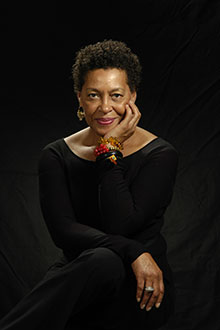
As the final speaker in this year’s Provost Lecture Series, artist and photographer Carrie Mae Weems will discuss “A History of Violence-Heave” on Monday, April 8, at Glenn Memorial Auditorium.
Artist Carrie Mae Weems is named for her mother, but following in another’s footsteps has never been her strong suit.
Weems works in multiple mediums — text, fabric, audio, digital images and installation video — but is best known as a photographer. She is the final speaker in Emory’s 2018–2019 Provost Lecture Series. Her talk, “A History of Violence-Heave,” will examine the complex and contradictory legacy of African American identity, class and culture in the United States. It takes place Monday, April 8, at 4 p.m. in Glenn Memorial Auditorium. Attendance is free, but those planning to participate should register.
Hailing from Portland, Oregon, the second of seven children, Weems recalls receiving a camera as a birthday gift at the age of 20 from a boyfriend. She and it seemed like old friends from the start. Her reaction was, “Oh, O.K. This is my tool. This is it.” And she had that exactly right.
Weems’s early work in the 1970s was done in documentary mode and often included family members. She completed her first collection of photographs, text and spoken work in “Family Pictures and Stories,” which debuted in 1983. Coming a few years later, “The Kitchen Table Series” (1989–1990) gave her increased visibility, and she has never looked back.
In that series, as so often is the case, Weems is not only behind the camera but in front of it. She describes “The Kitchen Table Series” as the story of a woman with a “bodacious manner, varied talents, hard laughter, and multiple opinions.” As Megan O’Grady wrote of the series when she profiled Weems in the Oct. 15, 2018, New York Times Magazine: “It inspired a new generation of artists who had never before seen a woman of color looking confidently out at them from a museum wall, and for whom Weems’s work represented the first time an African American woman could be seen reflecting her own experience and interiority in her art.”
Whenever anyone has attempted to limit Weems’s identity to being a black artist or woman artist, she has refused. She applauds what Georgia O’Keefe famously said: “Men put me down as the best woman painter. I think I’m one of the best painters.”
Making her mark
Weems earned degrees from California Institute of the Arts and University of California–San Diego, and also studied folklore at University of California–Berkeley. She came twice to New York to make her fame as an artist; it was the second attempt that stuck. Weems studied photography at the Studio Museum in Harlem, where she had a friend and mentor in the legendary Dawoud Bey, who has been an artist in residence here at Emory.
Weems has participated in numerous solo and group exhibitions at major national and international museums including the Metropolitan Museum of Art, the Frist Center for Visual Art, the Solomon R. Guggenheim Museum in New York and the Centro Andaluz de Arte Contemporáneo in Seville, Spain. At the Guggenheim, Weems was the first African American woman to have a retrospective—a feat she achieved in 2014.
The state of Georgia should count itself lucky, for beyond the Weems lecture here at Emory, her art is currently on display. Her “Autumn of the Patriarch” triptych (1997) is on view at the High Museum of Art, and both the Hammonds House in Atlanta and the Jepson Center in Savannah are showing her work. The Jepson Center has her “Sea Island Series,” 1991–1992. Weems became interested in Gullah culture while at UC–Berkeley; notably, this is the first time that series has been on view in the region in which the photographs were taken.
Weems is the recipient of major awards, including a MacArthur Fellowship in 2013, the Congressional Black Caucus Foundation’s Lifetime Achievement Award and the W.E.B. DuBois Award from Harvard University.
In the past several years, Weems has taken a characteristically hard look at the numerous cases of police brutality targeting African American men. Both of her 2017 short films, “People of a Darker Hue” and “Imagine If This Were You,” take up this subject. Now living in Syracuse, New York, part of the year, Weems founded Social Studies 101 there—a mentoring organization for local youth in creative professions.
“There are days, especially when we’re editing, when we just leave the studio in a shambles, or we’re just too mentally exhausted to look at another image of someone being shot,” she says. “But as much as I’m engaged with it, with violence, I remain ever hopeful that change is possible and necessary, and that we will get there. I believe that strongly, and representing that matters to me.”
The Provost Lecture Series offers students, faculty, staff and the public the opportunity to interact with groundbreaking scholars who deliver graduate lectures, public lectures and attend intimate receptions for Emory's academic community. Previous speakers in this year’s series included Eddie S. Glaude Jr., whose talk was titled “The Magician’s Serpent: Race and the Tragedy of American Democracy,” and Joy Buolamwini, who addressed “Dangers of the Coded Gaze.”
